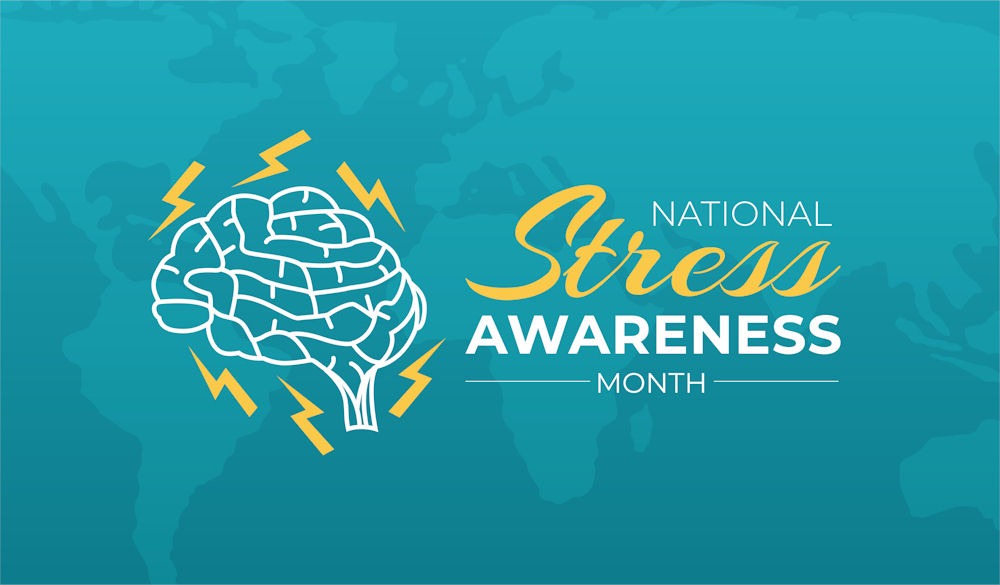In recognition of National Stress Awareness Month this April, it’s important to acknowledge the widespread prevalence of stress and its impact on mental health. Stress affects people in various ways, both physically and mentally. Therefore, it’s crucial to understand simple yet effective strategies for managing stress. By raising awareness and sharing coping techniques, individuals can build resilience and prioritize their mental well-being.
This month provides an opportunity for people to engage in discussions, learn, and support each other in reducing stress and promoting overall mental health. Let’s use this time to empower ourselves and others with the tools needed to navigate stress and lead healthier lives. So, even if you’re feeling good right now, it doesn’t hurt to get a few helpful reminders to maintain that healthy state of mind. Let’s get started!
What is Stress Awareness Month?

The history of Stress Awareness Month can be traced back to 1992 when it was first organized by the Health Resource Network (HRN), a non-profit organization based in the United States. HRN sought to create a platform to bring attention to the effects of stress on individuals and communities, emphasizing the importance of managing stress to lead a healthier life.
The main purpose of Stress Awareness Month is to educate people about stress-related issues and provide resources to help manage and reduce stress. Organizations, healthcare professionals, and mental health advocates across the globe take part in various activities during this month, such as workshops, webinars, and informational campaigns, to spread awareness and provide support for stress management. The goal is to equip individuals with the knowledge and tools to effectively cope with stress and improve their overall well-being.
Stress Awareness Month aims to reduce the stigma around mental health and encourage open conversations about stress and its impact. It is an opportunity for individuals to reflect on their stress levels, identify triggers, and implement healthy coping mechanisms. The ultimate objective is to promote a healthier society by encouraging stress reduction and fostering a supportive environment for individuals dealing with stress-related challenges.
Why Does Managing Stress Matter?
Chronic stress can take a major toll on both your physical and mental health. It’s been linked to a range of serious conditions, including high blood pressure, heart disease, obesity, diabetes, depression disorders, and anxiety disorders. These health issues can greatly impact one’s quality of life and overall longevity. Therefore, acquiring effective stress reduction and management techniques is crucial for maintaining well-being and promoting a healthier lifestyle.
By learning and practicing stress management skills, individuals can mitigate the harmful effects of chronic stress on their health. Techniques such as mindfulness, relaxation exercises, regular physical activity, and seeking social support can help alleviate stress and improve mental resilience. By prioritizing stress management, individuals can enhance their overall health and longevity, leading to a happier and more fulfilling life.
How Do I Get Involved with Stress Awareness Month?
Getting involved in Stress Awareness Month is easy. Here are a few ways you can spread awareness and start improving your mental health:
Share statistics, personal stories, self-care tips, and stress-reducing techniques on your social platforms. Use the hashtag #StressAwarenessMonth to join the conversation. Educating others about stress and mental health is a great way to reduce stigma and help those in need.
Make stress management a priority this month. Try relaxation techniques like yoga, meditation, or deep breathing. Exercise, eat healthy, and get enough sleep. Limit alcohol and caffeine intake. Taking good care of yourself will boost your mood and resilience.
Many organizations are working to advance research and provide resources for stress and mental health. Donate or volunteer your time for a cause you believe in. Even small acts of kindness can help.
Seek out local stress management and mental health events. Attend to learn coping strategies, connect with others, and gain insights. If none exist, consider organizing one with community support. Your involvement helps raise awareness and support mental well-being.
Participate in activities that help alleviate stress and promote relaxation. This could include hobbies such as painting, gardening, cooking, or listening to music. Engaging in enjoyable and fulfilling activities can distract from stressors and improve overall well-being.
If you’ve been dealing with high stress for a long time, consider speaking to a therapist. They can help determine if you may have an anxiety or stress disorder and provide targeted treatment. Managing stress is a lifelong skill, so get support if you need it.
Stress Awareness Month is the perfect time to start building better habits and coping strategies. Take action this month to improve your mental well-being and bring more peace of mind and joy into your life. Your health and happiness are worth it!
The first step to managing your stress is recognizing what causes it in the first place. Maybe it’s tight deadlines at work, financial worries, or relationship issues. Once you’ve pinpointed your stress triggers, you can make a plan to avoid or address them. Try keeping a journal to track stressful events, your reactions, and coping strategies. Other ways to improve mental health and reduce stress may include:
- Practice mindfulness and relaxation techniques such as meditation, deep breathing, or progressive muscle relaxation.
- Engage in regular physical activity, as exercise is known to release endorphins and improve mood.
- Maintain a balanced diet rich in fruits, vegetables, whole grains, and lean proteins, and limit consumption of caffeine and alcohol.
- Ensure you get enough quality sleep each night, aiming for 7-9 hours for most adults.
- Set realistic goals and priorities, and break tasks into manageable steps to avoid feeling overwhelmed.
- Establish healthy boundaries in your personal and professional lives to prevent burnout.
- Stay connected with friends, family, and supportive communities for social support and encouragement.
- Seek professional help if needed, such as therapy or counseling, to address underlying mental health concerns.
- Engage in activities you enjoy and find fulfilling, such as hobbies, creative pursuits, or spending time in nature.
- Practice self-compassion and kindness towards yourself, acknowledging that it’s okay to seek help and take breaks when needed.
Your mental health is just as important as your physical health, so make the time for yourself to find what works to keep your stress levels in check.
Westwind Recovery® Offers Programs for Mental Health Treatment

Structured and comprehensive plans are designed to address specific mental health or substance abuse issues and promote recovery and well-being. These programs aim to provide education, support, and resources to help individuals achieve and maintain long-term recovery and mental wellness.
Various treatment approaches and interventions aim to improve mental health, emotional well-being, and overall quality of life. These therapies are tailored to address specific challenges, promote personal growth, and enhance coping skills.
Sober living homes provide a supportive and structured living environment for individuals in recovery from substance abuse. Residents abide by rules such as sobriety, contributing to household chores, attending support meetings, fostering accountability, and promoting a substance-free lifestyle.
At Westwind Recovery®, we understand that mental health is a complex and deeply personal matter. That’s why our approach is holistic, incorporating evidence-based therapies, personalized treatment plans, and compassionate support to help clients achieve lasting recovery and emotional stability.
Our team of experienced clinicians, therapists, and support staff are dedicated to creating a safe and supportive environment where individuals can explore their challenges, learn coping strategies, and build the skills needed to thrive in their daily lives. Whether through individual therapy, group sessions, or specialized treatment modalities, we are committed to empowering our clients on their journey toward mental wellness.
If you or someone you know is struggling with mental health issues, we encourage you to reach out to us today. Together, we can work towards healing and a brighter future.

Dr. Deena is the Chief Clinical Officer of Westwind Recovery®, an award-winning outpatient treatment center in Los Angeles where she oversees the clinical and administrative program and treatment methods. Dr. Deena is a doctor of psychology and licensed clinical social worker since 1993. LCSW #20628. Originally from the East Coast, Dr. Deena has worked running treatment centers, worked as a therapist in psychiatric hospitals as well as school settings and currently has a thriving private practice in the LA area. Dr. Deena has appeared regularly on the Dr. Phil Show as an expert since 2003. She has also been featured on many other TV shows, podcasts and has contributed to written publications as well as podcasts.



